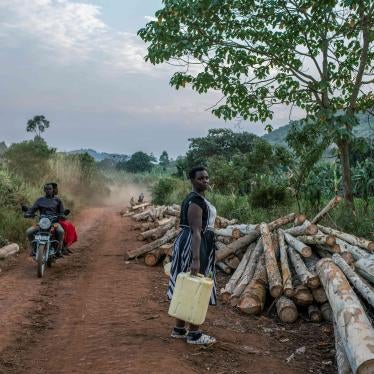The government of President Teodoro Obiang Nguema Mbasogo of Equatorial Guinea should immediately cease its suppression of independent voices ahead of presidential elections, a group of human rights and democracy organizations said today. The government should also reverse its March 16, 2016 order requiring a leading independent civic group to suspend operations indefinitely, the groups said.
President Obiang, in power since 1979, is seeking reelection in a vote hastily scheduled for April 24. He is the longest serving non-royal head of state in the world. His regime has been marked by longstanding repression.
“The mounting repression against civil society organizations reveals the government’s efforts to further silence independent voices and highlights the hostile and repressive environment being fostered ahead of the upcoming elections,” said Daniel Calingaert, Executive Vice President for External Relations at Freedom House.
Few nongovernmental groups in Equatorial Guinea operate independently of the government due to serious restrictions on freedom of expression, association, and assembly. Government officials perceive independent civic activists as political opponents. Such activists are vulnerable to harassment and reprisals from authorities.
On March 2, 2016, Equatorial Guinea’s Minister of Internal Affairs and Local Corporations Clemente Engonga Nguema Onguene, ordered the indefinite suspension of all activities by the Center for the Study and Initiatives for Development (Centro de Estudios e Iniciativas para el Desarrollo, CEID). The order was officially conveyed to CEID on March 16; and it alleges that comments made during a youth forum organized by CEID in January 2016, in the city of Bata, constituted “messages aimed at inciting violence and civil disobedience among the Equatoguinean youth,” and thus violated the country’s public order law and associations law.
The Minister of Interior also serves as the country’s First Deputy Prime Minister for Political Affairs and Democracy, and was recently appointed to head the National Electoral Commission overseeing the forthcoming presidential vote.
The groups dispute that any comments issued at the youth forum constituted “messages aimed at inciting violence and civil disobedience,” and maintain that comments made by participants at the forum were all protected speech well within the legitimate exercise of freedom of expression.
The groups also note that in any event the move to suspend CEID based on the comments of participants at their forum is disproportionate not least since the views of any participant do not necessarily imply the organization’s view. EG Justice has previously criticized the national laws applicable to civil society organizations as contravening constitutionally guaranteed freedoms.
CEID promotes civic engagement on a range of issues, including human rights, governance, and transparency. It is involved in the Extractive Industry Transparency Initiative (EITI), a global effort to promote openness about the management of natural resources. In light of the suspension order, CEID has stepped down from its role on the national steering group working to prepare Equatorial Guinea to reapply for membership in EITI, which requires unfettered civil society engagement. CEID is a co-founder of ― and until the suspension order, served as the Secretariat for — the Civil Society Coordinating Committee (Coordinadora de la Sociedad Civil, “Coordinadora”) a national coalition of 22 nongovernmental organizations, many of them also involved in EITI issues.
The suspension of CEID comes in the wake of other measures to crack down on independent civic activism in the country. In January 2016, the government forced CEID to cancel its youth forum after one day. The event was a first of its kind in Equatorial Guinea that brought together over one hundred and fifty young participants from various parts of the country.
In August 2015, the government dismissed the management team of Rebola Cultural Center (Casa de Cultura de Rebola) a cultural center which had been independently managed by local volunteers, and vowed to appoint a new team composed of members of the ruling political party. At the time, Minister of Interior Clemente Engonga was quoted as saying that the cultural center’s activities “go against the ideals of the ruling party and are unconstitutional.”
“Rather than enabling active citizen participation in the lead-up to elections, Equatorial Guinea’s government is creating an increasingly hostile environment,” said Tutu Alicante, Executive Director of EG Justice, “a vibrant civil society capable of assembling and of engaging in peaceful public debate is essential for a democratic society. The Obiang government, as it did when it suspended the Rebola Cultural Center, is relying on abusive laws and totally unfounded allegations to shut down a leading advocate for transparency and good governance.” Tutu added. “This draconian order must not be allowed to stand.”
The joint statement is signed by the following organizations:
Asociación Pro Derechos Humanos de España (APDHE)
Centro para la Apertura y el Desarrollo de América Latina (CADAL)
CIVICUS: World Alliance for Citizen Participation
EG Justice
Freedom House
Global Witness
Human Rights Watch
OXFAM America
Réseau International des Droits Humains (RIDH)
World Movement for Democracy







